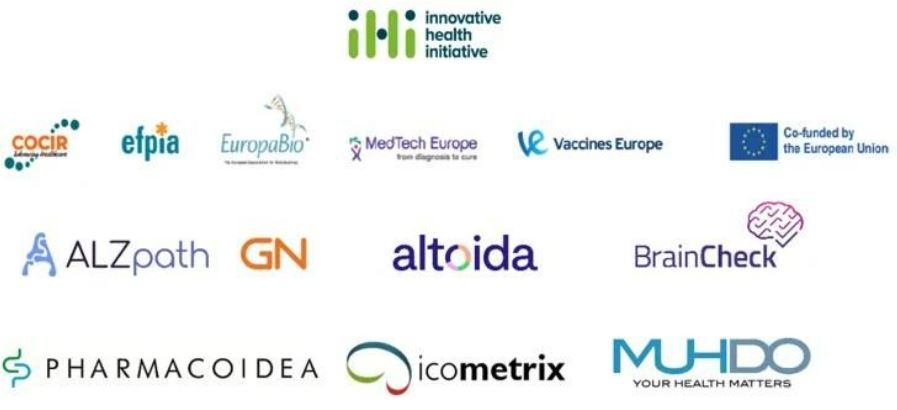As the number of individuals living with dementia in the European Union (EU) surpasses 7 million, projected to double by 2050, the PREDICTOM project emerges as a beacon of hope for early Alzheimer’s detection. Spearheaded by a consortium of 30 partners across academia, business, and hospitals, the initiative aims to combat the escalating trend of dementia.
GN Hearing, among other respected collaborators, is committed to exploring the complex factors associated with Alzheimer’s Disease, recognizing the increasing relevance of hearing loss in recent research findings.
“GN aims to expand the understanding of hearing loss as a risk factor for Alzheimer’s disease and collaborates with PREDICTOM ecosystem partners to develop innovative care solutions, supporting patients throughout their journey”
–Peter Aksel Villadsen, VP Digital & New Customer Experiences at GN Hearing
The projected trajectory of dementia underscores the urgent need for early detection and intervention, especially in the absence of a cure. Dianne Gove, Director for Public Involvement and Ethics at Alzheimer Europe, emphasized, “Timely diagnosis and treatment are essential as significant progress is made in the development of disease-modifying drugs.”
PREDICTOM’S AI-platform
PREDICTOM’s pioneering Artificial Intelligence (AI)-screening-platform aims to identify individuals at risk of developing dementia before symptoms appear. Led by Dag Aarsland, Professor of Old Age Psychiatry at King’s College London, the project seeks to revolutionize screening, enabling early discovery for timely intervention and preventative treatment.
“Detecting early signs of dementia is key to slowing its progression. Unfortunately, a majority of those at risk are not identified in time. Our platform seeks to change this by enabling early discovery, allowing timely intervention and preventative treatment”
–Dag Aarsland
The project’s unique approach allows participants to conduct much of the screening at home, significantly reducing strain on healthcare services and associated costs. Through the collection of various biomarkers like saliva, stool, digital markers, and blood (via prick-tests), PREDICTOM aims to streamline the diagnostic process, typically conducted in hospitals or specialized clinics.
With more than 4,000 participants from various previous projects and multiple countries involved, the trial project will assess the potential for significant cost and time savings while enhancing accessibility and tailoring diagnoses to individual patient needs.
Upon collection, the samples will undergo processing by PREDICTOM’s platform, integrating diverse biomarkers to generate risk assessments, early diagnoses, and prognosis using AI algorithms. This data will form the cornerstone for early intervention and treatment.
Collaborative Effort Between Academia, Business, and Hospitals
A consortium of 30 partners from academia, business, civil society, and hospitals, backed by EUR 21 million in funding (EUR 8 million from the EU, EUR 9 million from industry and EUR 4 million from UKRI), is steering PREDICTOM. The consortium includes partners from 15 countries across Europe, Asia and America and is led by Stavanger University Hospital (Norway).
This project is part of the Innovative Health Initiative (IHI), a public-private partnership (PPP) between the European Union and the European life science industries. The EU funding is provided through Horizon Europe, while the remaining funding for this project comes from Novo Nordisk A/S, GN Hearing A/S, Pharmacoidea Hungary, GE HealthCare, Siemens Healthineers, Icometrix Nv Belgium, ALZpath Inc USA, University of Geneva, Altoida USA, BrainCheck Inc USA, Muhdo Health Ltd, and UK Research and Innovation (UKRI).
The collaborative endeavor, combines expertise from different disciplines, including IT, AI, medicine, and aging research, aiming to transform the landscape of dementia diagnosis and management.

List of participating organizations in PREDICTOM
Altoida Inc, Alzheimer Europe, ALZpath Inc, BrainCheck Inc, Center for Research and Technology Hellas, Foundation Lygature, Fraunhofer-Gesellschaft research organization, GE HealthCare, GN Hearing AS, Health Research Institute Hospital La Fe Spain, Helse Stavanger HF (Stavanger University Hospital), Icometrix Nv, Joanneum Research Forschungsgesellschaft mbH, King’s College London, Klinikum der Universität München, Ludwig-Maximilians-Universitaet Muenchen, Muhdo Health Ltd, National Institute for Health and Care Excellence, Novo Nordisk A/S, Pharmacoidea Hungary, Qairnel, Siemens Healthineers, The University of Exeter, Universitatsklinikum Erlangen, University of Geneva, Vrije Universiteit Brussel.
Source: Alzheimer’s Europe







